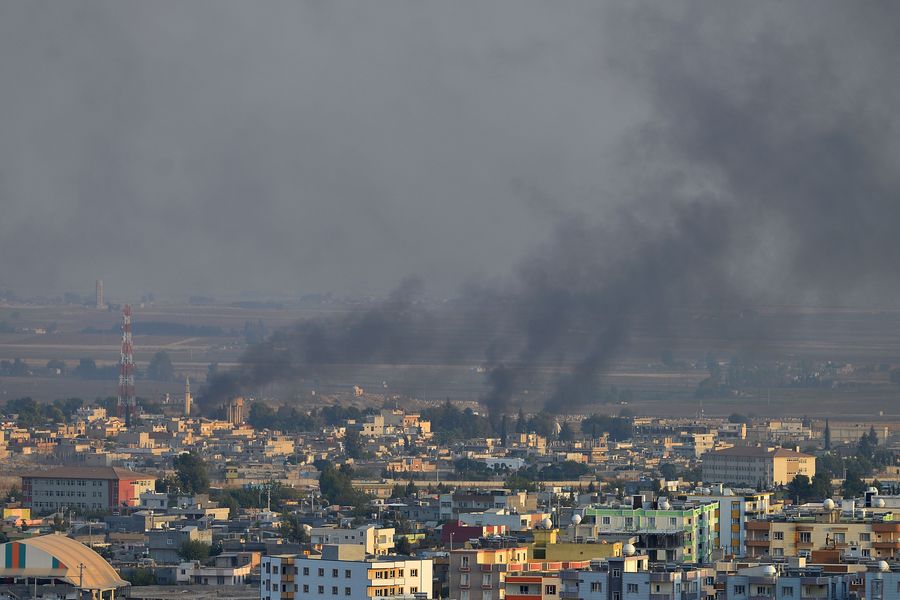
Photo taken from southern Turkish border town of Ceylanpinar on Oct. 10, 2019 shows smoke rising from the northern Syrian city of Ras al-Ain during an attack launched by Turkish army. (Xinhua/Mustafa Kaya)
Arab foreign ministers demand an "immediate and unconditional" withdrawal of the Turkish troops from northern Syria.
CAIRO, Oct. 12 (Xinhua) -- Arab foreign ministers demanded on Saturday, following their meeting at the Arab League (AL) headquarters in Cairo, an "immediate and unconditional" withdrawal of the Turkish troops from northern Syria.
Requested by Egypt, the meeting of the AL council of foreign ministers was held a couple of days after Turkey started on Wednesday an offensive on Kurdish-controlled areas in northeastern Syria, bordering southern Turkey, after the withdrawal of U.S. troops from the area.
In a joint statement following the meeting, the Arab top diplomats condemned the Turkish assault as "violation of the United Nations Charter and the resolutions of the UN Security Council that call for preserving the unity of Syria."
They also referred to Ankara's offensive as "the latest session of Turkish recurrent unacceptable interventions and aggressions on the sovereignty of AL member states."
Syria's membership at the league was suspended in 2011 over violent crackdown on protests, while several Arab states have since been calling for its return to the pan-Arab body.
In his remarks during the meeting, AL Secretary-General Ahmed Aboul-Gheit described the Turkish offensive in northern Syria, which Ankara refers to as "Operation Peace Spring," as "a military invasion."
"What Turkey is doing in Syria is a military offensive that violates the international legitimacy," said the AL chief, accusing Ankara of committing war crimes and crimes against humanity in Syria.
He explained that Turkey plans to seize 400 km of Syrian lands along the Syrian-Turkish borders, with a depth of up to 32 km into Syria, to displace the residents of those areas and replace them with Syrian refugees living in Turkey.
Aboul-Gheit warned that the Turkish offensive poses a threat to both regional and international stability, urging the international community to assume responsibility to put an end to the operation.
The final statement of Arab foreign ministers also rejected Turkey's attempts to make any demographic changes in Syria through the "safe zone" it seeks to create, stressing that such attempts violate the international law.
Only Qatar and Somalia had reservations on the final statement by the AL council of foreign ministers.
Turkey launched the ongoing military operation on Wednesday in northern Syria against the Kurdish-led Syrian Democratic Forces (SDF) and its militia known as the People's Protection Units (YPG), which are seen by Ankara as the Syrian offshoot of the outlawed Kurdistan Workers' Party (PKK) mainly based in Turkey.
The Turkish operation is carried out in cooperation with a Turkish-backed rebel armed group active in parts of northern Syria, formerly known as "the Free Syrian Army."
Egyptian Foreign Minister Sameh Shoukry told the meeting of Arab foreign ministers that the Turkish regime attempts to seize an area of influence inside Syria to implement forced demographic changes "under the pretext of fighting terrorism."
"History will strictly hold accountable whoever is involved in supporting the Turkish aggression on Syria and whoever refrained from backing the Syrian people," said the Egyptian foreign minister.
Shoukry also warned against the "catastrophic consequences" of the Turkish offensive including the possible reappearance and reassembly of defeated militants of the Islamic State (IS) terrorist organization, besides undermining the long-awaited political process in Syria.
For his part, Saudi Foreign Minister Adel al-Jubeir described the Turkish assault in northeastern Syria as "a blatant aggression on the Syrian sovereignty," warning that it might lead to the reappearance of IS militants and other terrorist groups.
The Saudi top diplomat called the international community to support the political process for a settlement in Syria and stressed the necessity of clearing Syria of all armed militias to pave the way for stability in the war-torn country.



